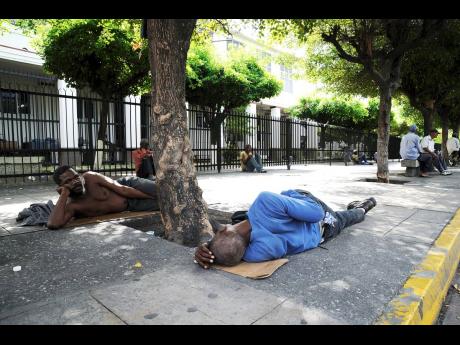Kristen Gyles | Homelessness doesn’t mean hopelessness
For some time now, it is estimated that over 2,000 Jamaicans are homeless. Almost half of that number are estimated to be mentally unwell. Persons falling within this category need especially close attention from the authorities because they pose a high risk of danger both to themselves and to others. There have been numerous instances of loss of life and property on account of mentally challenged people being left unsupervised for too long.
For example, late one night last year, police officers at the Grants Pen Police Station reportedly heard a commotion on the compound and went outside, only to see what appeared to be a mentally ill man holding a knife and a piece of board. The man had allegedly damaged several vehicles by either smashing their windshields or slashing the tires. The officers called out to the man, who became belligerent and threatening, and while advancing towards them, one of the officers shot him. After the incident, a relative of the man told the media that he had been receiving treatment for schizophrenia.
In another instance, earlier this year, a three-year-old boy was attacked by a man armed with a knife and an iron pipe, who was said to be of unsound mind. The boy’s mother and five other persons tried to intervene and were also attacked by the man. Fortunately, they survived the ordeal, but sadly, the boy was chopped to death. The aggressor was apprehended.
Without meaningful intervention, people of unsound mind who live on our roads will continue to endanger community members. They themselves are also far from safe as they wander the streets.
NUISANCE
By the very nature of homeless living, they are forced to find lodging at odd places and at odd times, and this can be a nuisance to members of the community. Further, many of the homeless rely on begging to get by. This can also be a nuisance to many Jamaicans who simply do not like to be approached by beggars and are sceptical of them, whether they are mentally unwell or not. Unfortunately, it is often at the point of these interactions that trouble starts to brew. Persons who are less than courteous when approached by beggars are sometimes met with verbal and/or physical attacks, especially when they do not give monetary assistance. The hostility sometimes leads to a full-blown altercation in which one or both parties may wind up hurt.
Being without a home in a country like Jamaica also means being constantly exposed to harsh weather conditions, like the pelting heat of the sun during hot days and floods of dirty water during rainy times. These conditions increase the likelihood of physical illness.
So, life without a home obviously has more than its fair share of challenges. This is why, over the years, numerous initiatives have been introduced to support homeless persons who struggle with mental illness. The Bellevue Hospital, which is regarded as the leading mental health facility in the Caribbean, still provides free psychiatric care for Jamaicans, and other hospitals offer psychiatric services. Furthermore, initiatives have been introduced which see psychiatric services being offered in homeless shelters.
Nonetheless, our efforts to address the issue of homelessness have fallen short, especially among the mentally ill. Those with the most acute mental challenges typically don’t go searching for help, and unless we connect them to the help that is available, they simply won’t get it.
With that said, the conversation now needs to be expanded to consider the remaining 50 per cent of the homeless community who are neither mentally ill nor struggling with any form of substance abuse.
LIKELY PHENOMENON
Homelessness is a much more likely phenomenon than many like to admit. It really isn’t very hard to become homeless. All that separates many of us from homelessness is job loss and a few missed mortgage payments. Once an individual is living pay cheque to pay cheque, or living hand-to-mouth, there is a high possibility that the next crisis, whether it be COVID 2.0 or World War III, could leave them without suitable housing. Under other dire circumstances, people lose their homes due to natural disasters, or find themselves having to flee their homes due to victimisation of various kinds. The point here is that homelessness is not nearly as far removed from the reality of the average Jamaican as we like to think.
This is partly why we should do more to ensure that those who do experience homelessness are not shut out, whether socially or otherwise, from basic opportunities in society. We can, and should, do more to ensure that opportunities exist for them to transition into the world of work, or supported in ways that will help them to maintain their employment.
According to the United States Interagency Council on Homelessness, between 40 and 60 per cent of the homeless population in the United States have jobs. This might not be our current reality in Jamaica, but should give us a glimpse into the possibilities that exist. In the United States, where it is understood that homelessness is often just temporary, it is not the expectation that an individual’s life should stop simply because they are homeless. Instead, facilities are put in place to help the individual get by until their situation improves. Such facilities include clean public bathrooms with bathing facilities and changing rooms, and meal centres or public kitchens which cater specifically to people who are homeless.
A little support can go a far way in helping a struggling individual get back on their feet in tough times. Homelessness does not have to mean hopelessness.
Kristen Gyles is a free-thinking public affairs opinionator. Send feedback to kristengyles@gmail.com and columns@gleanerjm.com.

